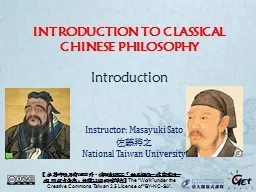PPT-Introduction to Classical Chinese Philosophy
Author : tatyana-admore | Published Date : 2016-11-23
By Masayuki Sato Lecture Four Confucius and the Analects 本著作除另有註明外採取 創用 CC 姓名標示非商業性相同方式分享台灣 25 版 授權釋出
Presentation Embed Code
Download Presentation
Download Presentation The PPT/PDF document "Introduction to Classical Chinese Philos..." is the property of its rightful owner. Permission is granted to download and print the materials on this website for personal, non-commercial use only, and to display it on your personal computer provided you do not modify the materials and that you retain all copyright notices contained in the materials. By downloading content from our website, you accept the terms of this agreement.
Introduction to Classical Chinese Philosophy: Transcript
Download Rules Of Document
"Introduction to Classical Chinese Philosophy"The content belongs to its owner. You may download and print it for personal use, without modification, and keep all copyright notices. By downloading, you agree to these terms.
Related Documents














